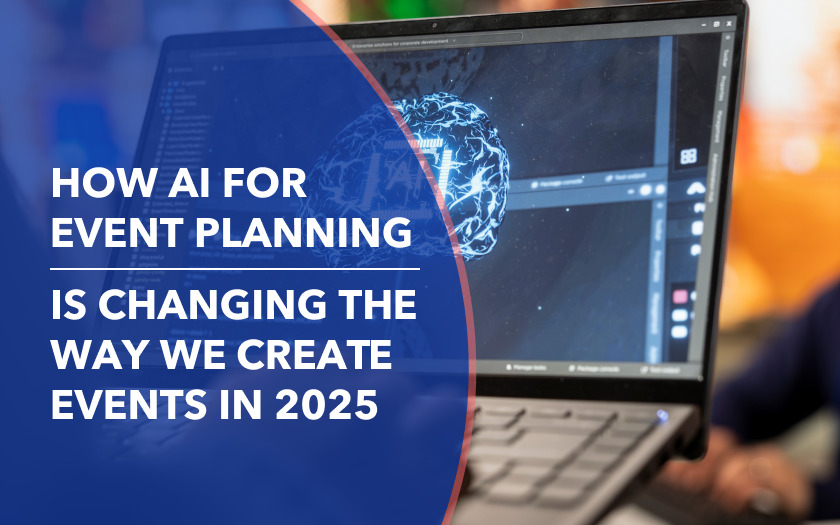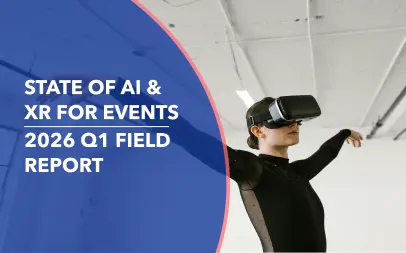How AI for Event Planning is Changing the Way We Create Events in 2025


If you’re anything like me, you’ve probably let Spotify’s AI DJ set the vibe for your morning coffee or asked your smart assistant to remind you about a meeting. AI has quietly slipped into our daily routines in 2025, making playlists, drafting emails, even suggesting what to cook for dinner. It’s no longer just a “tech trend”; it’s part of how we live.
Now, take that same idea and apply it to events. Imagine if planning a conference, trade show, or virtual gathering was as seamless as getting that perfect playlist, curated, timed, and ready to go. That’s exactly what’s happening with AI for event planning.
According to the State of XR and AI in Events 2025 Report, AI has shifted from being a helpful assistant to a true co-pilot for event organizers. From budgeting to scheduling, personalization to risk management, AI is changing how events are created and delivered. And here’s the kicker: the organizers who adopt it now are the ones setting the standard for the future.
{{table-of-contents}}
The Rise of AI in Event Planning
A few years ago, AI in events felt more like an experiment, something organizers tested out for marketing copy or a quick design mockup. Fast forward to 2025, and the story looks very different. According to the State of XR and AI in Events 2025 Report, AI now touches nearly every stage of the event lifecycle, from brainstorming ideas to post-event analysis.
If you’re curious to try some of these AI features for yourself, Remo’s free event planning tools are a great place to start. From generating unique event names to building a run of show in minutes, these tools give organizers a taste of how AI can simplify the planning process.
Organizers are no longer just using AI as a side tool, it’s becoming central to how events are built. Here's how AI is transforming event planning:
- Brainstorming event ideas and topics: AI-powered idea generators help organizers come up with fresh concepts, trending themes, and engaging session topics tailored to their audience.
- Forecasting attendance: Tools like Agentic AI and run.events use predictive analytics to estimate attendee numbers, helping planners allocate resources effectively.
- Generating a run of show: Platforms such as Remo's AI Run of Show & Event Agenda Generator automatically create detailed event schedules in minutes, streamlining the planning process.
- Speaker and sponsor research: AI tools can scout relevant speakers and sponsors, analyze their fit for the event, and even automate outreach to kickstart conversations.
- Supporting planning decisions: While AI hasn’t yet fully automated budget creation, it can still help organizers make smarter choices about resource allocation and event logistics.
The key takeaway? AI isn’t replacing human creativity, it’s evolving from a helpful assistant into an intelligent partner. Event planners still steer the vision, but AI guides smarter decisions, flags potential obstacles, and makes the entire planning process smoother.
Why AI Matters for Event Planning

Event planning has always been a juggling act: budgets, vendors, schedules, last-minute changes. In 2025, AI steps in not to replace planners, but to make that juggling less overwhelming. Here’s why it matters:
1. Efficiency with lean teams
Budgets are tighter, timelines are shorter, and teams are smaller. AI can take on repetitive tasks, like building schedules or sourcing vendors, so organizers can focus on strategy and creativity.
2. Personalization at scale
Attendees now expect curated experiences, not cookie-cutter agendas. AI tools for event planning help match guests with sessions, suggest networking opportunities, and tailor content to individual preferences, all automatically.
3. Smarter budgeting and forecasting
Using AI for event planning also reduces risk. Predictive tools forecast attendance, track spending, and adjust budgets in real time, so overspending and under-preparing become less likely.
4. Low-risk, high-reward adoption
Unlike XR hardware or big tech rollouts, most AI solutions are software-based and easy to test. Organizers can start small, say, generating a run of show, and expand once they see results.
The bottom line? AI helps planners do more with less, while delivering experiences that feel more personal to attendees. And while there are dozens of tools out there, top virtual event platforms, like Remo, are already weaving these capabilities directly into the planning process, making it even easier for teams to get started.
How to Use AI for Event Planning in 2025
Knowing why AI matters is one thing, figuring out how to use AI for event planning is another. The good news? Tools are available today that can support organizers at nearly every stage of the planning process. Here’s a breakdown:
1. Strategy & Ideation
This is where ideas take shape. Traditionally, brainstorming event ideas or testing formats could take days of research and team alignment. With AI, it’s much faster.
- Use Case: An organizer feeds prompts into AI and instantly gets three event theme options, each paired with mood boards and messaging ideas, ready to present to stakeholders in minutes.
2. Content Generation
Once the big picture is set, organizers need words and assets to bring the event to life, everything from catchy event descriptions to speaker bios, marketing emails, and social media posts. AI is stepping in as a creative assistant.
- Use case: An organizer asks AI to draft a speaker bio, then fine-tunes the copy to reflect the speaker’s personality and professional achievements. Or they might use AI to generate multiple versions of an event email and pick the strongest one.
3. Budgeting & Scheduling
Once the concept is locked in, the hard math begins. This stage often eats up the most time, but AI is making it less painful.
- Use case: An organizer might use AI to quickly compare vendor quotes, project costs for different venues, or get a rough forecast on staffing expenses. It’s not fully automated, but it speeds up the manual legwork and helps planners make smarter, data-informed choices.
4. Vendor Management
Between sourcing quotes, reviewing contracts, and juggling timelines, vendor coordination can eat up a huge chunk of planning time. AI is starting to lighten that load.
- Use case: Instead of manually emailing multiple AV companies, an AI tool could scan options, recommend the best fits, and remind you of decision deadlines.
5. Task Management
Event planning is a whirlwind of to-dos, and things can easily slip through the cracks. Here, AI acts like a digital project manager, keeping planners on track.
- Use case: An organizer could use AI to automatically build a planning timeline, assign tasks to team members, and flag bottlenecks before they cause delays.
6. Risk Management & Forecasting
Events always come with uncertainty, like weather, supply issues, orlast-minute cancellations. AI is becoming an “event radar,” scanning for risks before they spiral.
- Use case: If a storm threatens travel to a conference, AI can suggest backup suppliers or reschedule sessions to minimize disruption.
Together, these stages show that AI tools for event planning aren’t just nice-to-haves, they’re becoming essential for organizers who want to save time, cut costs, and reduce stress while delivering memorable events.
Top AI Tools for Event Planning in 2025

With so many AI products out there, it can feel overwhelming to figure out which ones actually help you plan better. So, we’ve evaluated and compiled a list of the best AI tools for event planning worth knowing about in 2025:
Planning & Ideation
- ChatGPT / Claude: Great for audience research, competitor analysis, or drafting event concepts.
- Recraft.ai: High-quality visuals and mockups for stage design or branding.
- Remo AI Event Idea Generator: Produces unique event concepts without hours of brainstorming.
Budgeting & Scheduling
- Glue Up: Helps forecast attendance and adjust budgets accordingly.
- Taskade: AI-powered task management, workflows, and visual scheduling.
- Trevor AI: Smart scheduling assistant that balances agendas and resources.
Vendor & Task Coordination
- Asana with AI Assist: Organize complex projects, assign tasks, and get AI-generated status updates.
- Notion AI: Centralize planning docs, vendor details, and automate updates across the team.
- ClickUp AI: Create event timelines, generate task lists, and track vendor communication in one place with built-in AI assistance.
Risk Management & Forecasting
- Forecast.app: Predicts resourcing needs and financial risks.
- ProSymmetry Tempus AI: Scenario planning to anticipate bottlenecks.
- Spark AI: Monitors event data in real time and flags potential risks before they escalate.
These tools are simple, free to try, and great for tackling specific tasks. The catch? Most AI platforms focus on just one slice of event planning, maybe brainstorming, scheduling, or budgeting, but rarely the full journey. That’s where Remo’s free AI-powered event planning tools are starting to stand out. Instead of solving for one piece, Remo is building tools that support multiple stages of the planning process, from generating event names and brainstorming ideas to suggesting formats and mapping out agendas. It’s an early move toward AI that truly understands event planning as a whole.
The Results of Using AI for Event Planning
So what happens when you actually put these tools to work? The results speak for themselves. Organizers who have embraced AI for event planning are already seeing big wins across the board.
1. Faster turnaround times
What used to take weeks of back-and-forth, like drafting an agenda or creating a run of show, can now be done in minutes. That kind of speed means events get off the ground faster, and teams stay agile.
2. More accurate budgets and forecasting
AI doesn’t just crunch numbers, it predicts them. By analyzing historical data and current trends, AI tools help planners avoid overspending or under-preparing. The State of XR AI 2025 Q2 Field Report highlights that this proactive approach reduces the risk of financial losses, especially for large-scale events where even small miscalculations can snowball.
3. Higher attendee satisfaction
From personalized agendas to AI-powered matchmaking, guests now get experiences that feel tailored to them, not mass-produced. According to the State of XR AI 2025 Q2 Field Report report, personalization consistently ranks as a top benefit of using AI for event planning, and attendees are more likely to return when they feel seen and valued.
4. More room for creativity and strategy
Perhaps the biggest result isn’t about efficiency at all, it’s about freeing people up. With AI handling repetitive tasks, planners can focus on the bigger picture: shaping the event experience, building partnerships, and driving engagement, all things AI cannot do very well.
AI isn’t just making event planning faster or cheaper, it’s making it better. But here’s the catch: it only works if humans stay in the driver’s seat. Without thoughtful guidance, AI can churn out generic ideas, overlook cultural nuances, or miss the emotional details that make an event unforgettable.
That’s why the real magic isn’t “AI versus humans,” it’s “AI with humans.” The tech takes care of the heavy lifting, while planners bring in the creativity, strategy, and empathy that no algorithm can replicate.
Challenges and What to Watch Out For

For all its benefits, using AI for event planning isn’t without its challenges. Before diving headfirst into the latest tools, planners should keep a few watch-outs in mind:
1. Fragmented tools
One of the biggest headaches right now is that most AI tools don’t “speak” to each other. You might use one for scheduling, another for budgeting, and a third for content, but stitching them together can get messy. Until more integrated solutions arrive, expect some manual work in connecting the dots.
2. Human oversight is essential
AI may be smart, but it isn’t infallible. Think of it as a co-pilot, not a replacement. Whether it’s fact-checking AI-generated content or adjusting an auto-built schedule, human judgment is still critical to keep events running smoothly.
3. Data privacy and security
Events involve sensitive information, attendee lists, payment data, contracts, and more. Feeding this into AI platforms raises valid questions about storage, usage, and compliance. Organizers need to be selective about which tools they trust and ensure proper data protections are in place.
4. The risk of over-automation
AI can save time, but lean on it too much and you risk losing the human touch that makes events memorable. Guests still crave authentic experiences, things an algorithm can’t fully replicate. AI should support creativity, not replace it.
The key takeaway? AI is powerful, but like any tool, it works best in balance. The organizers who see the most success are those who combine AI’s efficiency with their own expertise, creativity, and personal touch.
What’s Next: The Future of AI in Event Planning
If 2025 is the year AI became a planning partner for event organizers, the future looks even more transformative. We’re on the cusp of moving from scattered tools to fully connected ecosystems.
From siloed tools to integrated ecosystems
Right now, most planners juggle multiple apps, one for scheduling, one for budgeting, and another for vendor management. The future lies in platforms that bring all of these together, reducing friction and giving organizers a single command center for their events.
From single-task AI to multi-step AI agents
Early AI tools are great at one-off tasks, like generating an agenda or suggesting themes. But next-gen AI agents are being trained to handle entire workflows, researching, planning, scheduling, and even coordinating across different tools without constant human input.
From reactive to predictive planning
Most AI today reacts to your prompts. The next leap is predictive support, AI that doesn’t just respond, but anticipates your needs. Imagine an AI that alerts you to a weather risk weeks ahead or recommends shifting sessions based on real-time engagement trends. That’s where we’re headed.
2025 marks the turning point. We’ve moved past experimenting with AI tools for event planning and into an era where they’re becoming essential infrastructure. The future won’t be about choosing one AI app, it will be about working with an intelligent ecosystem that plans alongside you, every step of the way, a true co-pilot.
Planning Smarter, Not Harder with AI
AI isn’t here to replace event planners, it’s here to empower them. From ideation to scheduling to risk management, AI for event planning is helping organizers cut through the noise, save time, and create experiences that feel more personal and impactful.
The best part? You don’t need to overhaul your entire process to get started. Experiment with one tool, like generating an agenda or brainstorming event names, and scale up as you see results.
Ready to put it into practice? Try Remo’s AI-powered planning tools to streamline your next event and see firsthand how much time and stress they can save. And if you want the bigger picture, dive into the State of XR and AI in Events 2025 Report by Events.com, for deeper insights into how AI is shaping the future of our industry.
Frequently Asked Questions about AI for Event Planning
1. How is AI transforming the event planning industry in 2025?
AI is shifting from a nice-to-have to a core part of planning. In 2025, AI for event planning helps organizers move faster, make smarter budget decisions, and deliver more personalized attendee experiences. It’s not replacing planners, it’s becoming their planning partner.
2. What are the main benefits of using AI for event planning and management?
The biggest benefits include saving time on repetitive tasks, improving forecasting accuracy, cutting costs, and personalizing events at scale. AI also frees up organizers to focus on strategy and creativity instead of admin work.
3. How can AI personalize attendee experiences and improve engagement?
AI can recommend sessions based on attendee interests, suggest networking matches, and create tailored agendas automatically. This makes guests feel seen, improves engagement during the event, and increases the likelihood they’ll return in the future.







.webp)



















